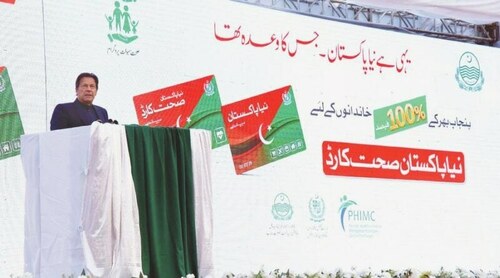PESHAWAR: Women outnumbered men in availing free treatment in Khyber Pakhtunkhwa under Sehat Card Plus (SCP) as 56 per cent of them received medical care under the health insurance scheme as compared to 44 per cent men.
According to the latest data, of the total 1,058,797 people admitted t hospitals on SCP so far, 594,277 [56pc] were women and 464,520 [44pc] were men. They received cashless treatment facilities at 1,100 empanelled hospitals across the country.
It said that 4,66,177 patients aged 30 to 59 years got health services under the programme, followed by 2,99,904 patients whose ages were recorded from 10 to 29 years. Under the programme, hospitals treated 202,696 patients in age groups of 60 to 79 years while 19,720 were above 80 years. The number of children below 10 years treated on SCP was 70,300.
The government has spent Rs25.834 billion on free treatment of people so far, with Rs5.24 billion going to the treatment of cardiac patients, Rs3.10 billion to general surgery, Rs2.39 billion gynaecology and over Rs1 billion were consumed on treatment in each medical, neurosurgery, orthopaedic, oncology, urology and cardiac surgery disciplines.
Govt has so far spent Rs25.834 billion on the programme
As per data, 49 people underwent free liver transplant surgery at a cost of Rs199 million. Each case costs Rs5 million as it is the most expensive procedure offered on SCP to the residents of Khyber Pakhtunkhwa.
The patients, who received free renal transplants, numbered 73 at a cost of Rs102 million. Kidney transplant is the second costly procedure on SCP.
District-wise breakup of beneficiaries shows that 108,127 patients belong to Peshawar, 101,385 to Mardan, 98,691 to Swat, 66,297 to Charsadda, 74,566 to Swabi, 63,002 to Lower Dir, 56,855 to Abbottabad, 48,052 to Mansehra, 33,143 to Buner, 32,203 to Haripur, 30,906 to Malakand, 28,824 to Shangla, 24,180 to Dera Ismail Khan and 13,866 to Hangu while the remaining settled districts recorded 10,000 patients each for receiving cashless treatment.
In the newly-merged districts, where SCP was extended in June, after stoppage of funding by the federal government, 15,880 patients received services from Khyber, 7,310 from Mohmand, 3,774 from South Waziristan and 3,587 from North Waziristan.
Private hospitals continue to draw bulk of the amount from the programme. Private health facilities admitted 707,098 [67pc] patients and public sector 351699 [33pc] with the former earning Rs17.30 billion and the latter Rs8.53 billion from the flagship programme of the provincial government under which all of 9.5 million families are entitled to free services in designated hospitals across the country.
The government has been asking the public sector hospitals to receive more patients on SCP to generate more revenues as their infrastructure is better than private facilities. Many of the public sector facilities are yet to implement the formula devised by the government for distribution of share from the income of the programme due to which the doctors are not interested in it.
Some of the public hospitals are receiving sizeable amount from SCP as they give proper share to the doctors and other staff involved in treatment of patients. As opposed to public hospitals, the private ones receive more patients because they have already a setup designed for such services.
The government has planned to start awareness sessions for public sector hospitals to attract more patients and get more revenues. Last month, Lady Reading Hospital, the biggest health facility in the province, ordered the staff to treat all patients on SCP.
After extension of the programme to entire population of the province in December 2020, the number of patients has increased and the health department wants the hospitals to earn more from it.
On Thursday, Provincial Doctors Association (PDA) held a meeting with Dr Mohammad Riaz Tanoli, the head of SCP, to discuss the share of doctors in the earning from the programme.
Published in Dawn, December 16th, 2022












































